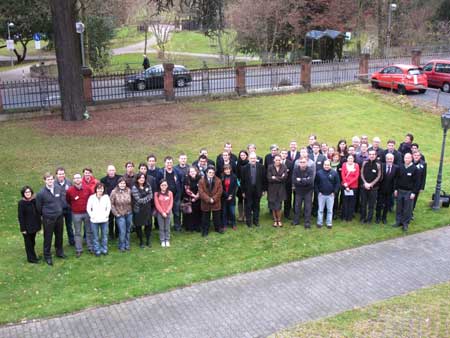
Summary of the 494th Wilhelm and Else Heraeus Seminar on "Innovative Nuclear Power in a Closed Fuel Cycle Scenario"
December 5-8, 2011 - Physikzentrum Bad Honnef, Germany
Key factors relevant for sustainable nuclear energy are related to the optimization of resources utilization, the solution for the waste treatment and the reduction of waste generated per unit of electricity produced. Moreover, economy, efficiency and proliferation resistance are additional important factors addressed within the new generation of nuclear systems and advanced fuel cycles.
The objective of the seminar was to show the essential bricks needed to implement innovative nuclear power in advance fuel cycles to reach the above state goals. The seminar has been built by considering multidisciplinary challenges that are encountered in the main technological areas, i.e. reactor physics, thermal-hydraulics and safety, structural and fuels materials, separation and actinide chemistry and geochemistry and advanced modeling in the different field.
The contributions did address the new challenges and frontier research has been illustrated in all the major technical fields mentioned above. More general and strategy-oriented lectures were also included in the program, in order to provide a wider perspective, also from the European point of view.
From the lectures and the numerous debates that have taken place, with the participation both of the lecturers and the young scientists, it has emerged that fast neutron reactors are reference solutions to address the nuclear energy sustainability due to their core design flexibility, which can be tuned as breeder and/or burner of actinides. The implementation of these systems in advanced fuel cycle implies also advancement in the field of actinide chemistry. Innovative actinide partitioning processes, where the separation strategies of the actinides with new molecules (in case of hydrochemistry) and with advanced electrochemical methods (in case of pyrochemistry) have been discussed. Moreover, the challenges faced in the field of new fuel fabrication, new materials, coolant thermal-hydraulics and reactor physics have been extensively discussed. Finally, it has been reminded that a final repository is mandatory, whatever strategy is implemented. The reduction of the amount of actinides send to the repository will certainly reduce the burden on it, but will never eliminate the need for it.

From the presentations and discussions it has emerged that the plan for implementation of advanced fuel cycles with fast neutron reactors might be different in the different world regions. For instance, alternative solutions such as small modular reactors have been as well addressed, where the economic aspect, in terms of investment cost and the potential shorter licensing delays seem to be rather relevant.
A further important outcome of this seminar has been that sustainability has to be associated to enhanced safety requirements and improved robustness of technologies.
Finally, lively discussion have been emerged from the speeches addressing strategic aspects as for instance the trend of acceptance of nuclear energy from the early fifties of the last century until today; the views of implementing nuclear energy and renewables in an energy mix to reduce the emission in the atmosphere of pollutant gases.
The lectures have been given by 21 internationally re-known experts coming from eight countries (Germany, France, US, Japan, Czech Republic, Belgium, Spain and Austria) and the seminar was attended by forty young scientists. The interests and expertise of the lecturers have triggered exchange of views and discussions that took place after each presentation with an excellent interaction among young scientists and experts.
Finally, the participants had a chance to present their current activities within a very interactive poster sessions and best poster prices have been awarded to Raffaele Bencardino from IRMM-JRC for his work on “4π detection system for the measurement of the 6Li(n,α)3H reaction cross-section”; Carole Babelot from FZJ for her work on “Conditioning of minor actinides Conditioning of minor actinides in La-Monazite-type ceramics” and to Barbara Vezzoni from KIT for her work on “Analysis of transition nuclear fuel cycles from LWRs to Gen-IV reactors”.
The Seminar is kindly and generously funded by the Wilhelm and Else Heraeus Foundaton. The Foundation is a private in-stitution which supports scientific research and education with emphasis on physics. More information is given at: www.we-heraeus-stiftung.de.
The program of the seminar, the lectures and the presented posters are available at the link: www.nuklear.kit.edu/88.php.
Contact: Concetta Fazio KIT-NUKLEAR (concetta.fazio@kit.edu) and Joachim Knebel KIT-CSO.
|

